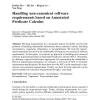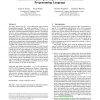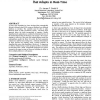275 search results - page 39 / 55 » Sequential Construction of Logical Forms |
KAIS
2007
13 years 7 months ago
2007
Eliciting requirements for a proposed system inevitably involves the problem of handling undesirable information about customer’s needs, including inconsistency, vagueness, redun...
PLPV
2009
ACM
14 years 4 months ago
2009
ACM
This paper is part of a line of work on using the logical techniques of polarity and focusing to design a dependent programming language, with particular emphasis on programming w...
ICFP
2006
ACM
14 years 7 months ago
2006
ACM
The development of design patterns in object-oriented programming aims at capturing good software design in a re-usable generic form. However, design patterns are not expressible ...
ICFP
2005
ACM
14 years 7 months ago
2005
ACM
This paper defines PolyAML, a typed functional, aspect-oriented programming language. The main contribution of PolyAML is the seamless integration of polymorphism, run-time type a...
GECCO
2005
Springer
14 years 1 months ago
2005
Springer
A fuzzy logic algorithm has been developed that automatically allocates electronic attack (EA) resources distributed over different platforms in real-time. The controller must be ...



